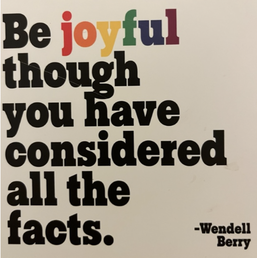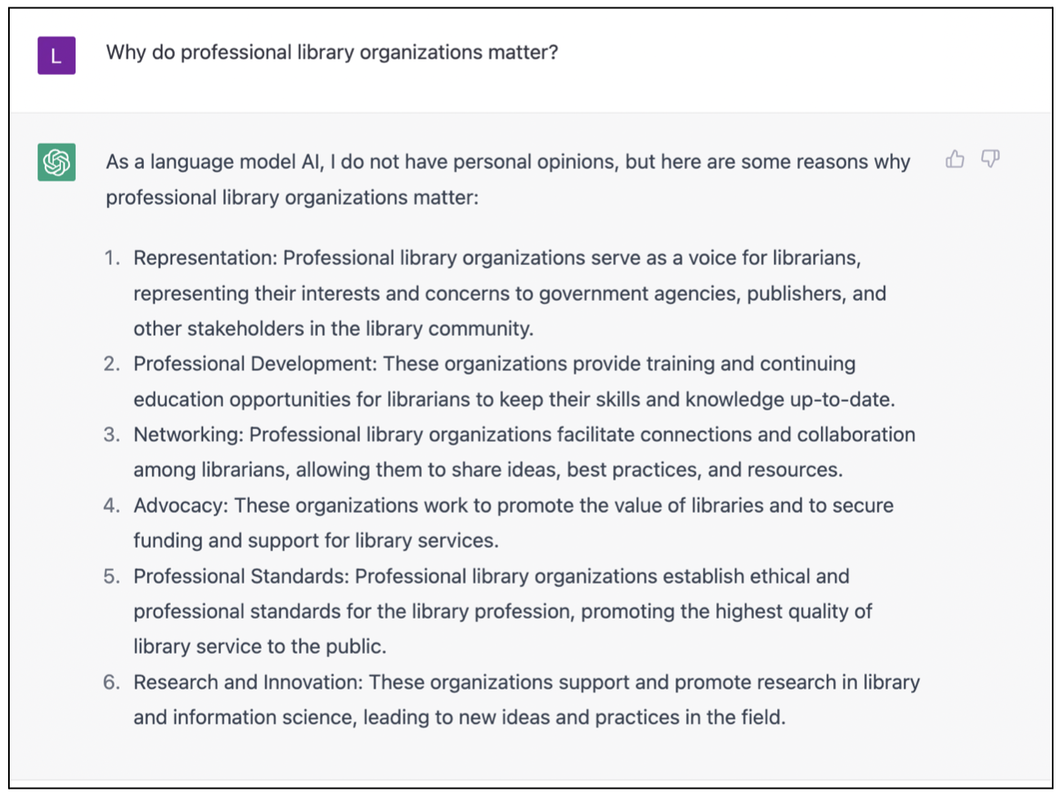|
MSLA President Jen Varney is the Librarian at the Dr. Martin Luther King, Jr. School in Cambridge, MA Wow. What a year, huh?
As I realize that there are only 6 more weeks (!) of my presidency, it’s easy to think of all the things that didn’t get accomplished. I thought I might go on a listening tour, start a mentorship program, work on some DEI initiatives. Instead, about 6 weeks into my term, I was called into a 4-hr long Saturday afternoon Zoom meeting with the ALA Intellectual Freedom office. In that meeting, state chapter representatives were warned of a new and intense wave of book challenges and ‘adverse legislation.’ And after that, Intellectual Freedom became the defining theme of my 2 years in office. Reba Tierney is the Library Teacher at Waltham High School in Waltham, MA This will be my last issue as co-editor of The Forum. In honor of both my first ever Forum issue as editor, and our incoming President, Ms. Barb Fecteau, I'm happy to bring back this column from October 2017. Barb had been awarded a Super Librarian Award, and the topic of her column for the Forum was Musings on Banned Books...Or, how to engage your critical stakeholders. I was a little hesitant to feature yet another article on banned or challenged books, but the confluence of it being my first issue as editor, of Barb being the author of this article as we prepare for her presidency, and the fact that Barb's article is really about so much more than Banned Books (trust me, it's worth the read/reread) and I couldn't resist. I hope you enjoy it as much as I did.
I've loved my time on the Forum, and as I pass the baton to the wonderful Michelle Fontaine, I know the future of the Forum is in good hands. Luke Steere will continue on as co-editor, and I look forward to reading future issues! Magenta Jasinski is the Library Assistant at Fenway High School and a MA/MLIS Candidate at Simmons University. 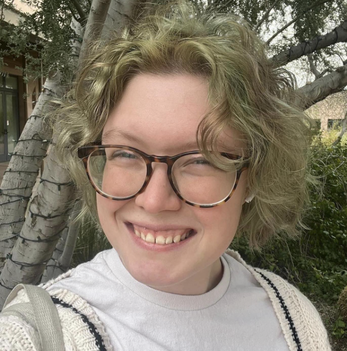 1. What's your name, title and school? Magenta Jasinski, Library Assistant at Fenway High School and MA/MLIS Candidate at Simmons University. 2. How did you come to librarianship? I came to librarianship at the ripe old age of 16, when I started working at a page at the Pauline Haass Public Library in Sussex, Wisconsin. It was an upgrade from the previous job I had, and I fell in love with the field when we did a group "page tour" around the library. I got to talk to all of the full-time librarians about what they do and why they like doing it. I connected with the youth services librarian, who I referenced in my personal statement to get into grad school. From then on, I've been working, volunteering, or interning in libraries of all types— in a church, a toy library, schools, public libraries, and more. 3. How would you explain the importance of your role to a nonlibrarian? My role as a library assistant in a high school is to support the librarian. I do all of the things she doesn't have time for, like shelving books, making sure the printer is working, making sure kids are leaving when the library is closing, preparing materials as requested, and any other tasks laying around. If it wasn’t for this position, the librarian wouldn't have time to do the more important things like co-teaching, research help, and more. 4. What are you working on right now? I'm working on a lot of MLIS stuff, like a thesis paper for my Fundamentals of School Library Teaching class, as well as long-term projects. These include developing a camp library for Camp Lightbulb, where I'll be working in July; I'm also doing a diversity audit for my school library. Further out, I'm working on creating a Student Interest Group (SIG) for MSLA and Salem State and Simmons for students to connect with each other, as well as brainstorming ideas for my capstone project. 5. What is going well? I've found that I really enjoy getting to know students and having an informal relationship with them, as well as making the librarian's life easier. Since my second job is a graduate assistant for the Simmons Center for Community Engagement, I've done programming with my high schoolers outside of their school building, which was exciting. This position has been my first in a school setting, so I've been enjoying learning everything I can as I apply for full-time jobs. 6. What is the most challenging thing so far? The most challenging thing has been behavior enforcement. I want students to see me as a resource they can come to or just someone to chat with, as I'm not THAT much older than them. However, when they're making out in the shadowy corners of the library and I have to close the space, I hate having to break them up. The awkward conversations and “please quiet down” reminders aren't my favorite. 7. What's the most unexpected thing about your new job? The most unexpected thing was the connection I've forged with the librarian. Bonnie McBride (Ms. McB, as students call her) is one of the best people I could be working with in this capacity, and she's been a great resource. I didn't think that we would mesh on a personal and a professional level, and it's been fantastic to have her as a job reference and role model to look up to (even though she's shorter than me!). 8. What are you reading or watching? I've been trying to read the queer books that have been donated to the Camp Lightbulb Library, so my most recent titles have been Red, White, and Royal Blue by Casey McQuiston (read her coming out article here: I loved it so much), I Was Born for This by Alice Oseman, and She's Not There: A Life in Two Genders by Jennifer Finney Boylan. I can't just read one book! I've been watching Cowboy Bebop and Twin Peaks: The Return while I do homework. 9. What do you hope the MA School Library Association can do for you? I hope the MSLA can help me further my professional development and help me start off strong in the profession with networking. I've been a member since February, which is only about two months, but I've gotten so much out of the group already. I've gotten many donations for my camp library from the Listerv, I've connected with a lot of people at this past conference in March, I've been able to send articles to those who request them, and I feel like I have a good group of people I can go to for advice and support. Like I mentioned, I'd love for MSLA to help me start the SIG, so I hope that happens! Courtney Ahearn is the librarian at the Annie L. Sargent Elementary School in North Andover, MA Like many Americans during the height of the pandemic, my husband and I decided to try our hand at raising chickens. Over the last three years our flock has grown (due to a phenomenon known as “chicken math”) and we now have over thirty feathered friends in our backyard. We have developed a reputation in our school district as being “chicken people”. My husband, a high school science teacher, has hatched chickens in his classroom over the past two years with great success.
Kendall Boninti is the Instructional Technology Specialist at Cambridge Rindge & Latin School in Cambridge, MA In my last tech column, “Copyright for Creators,” we explored the ethical and legal implications around student use of copyrighted material and broke down the ways in which educators can help students understand the role of copyright and fair use to support innovation. Since then, the discussion around Artificial Intelligence (A.I.) and copyright has exploded. I particularly enjoyed the recently published NY Times article “Who Owns a Song Created by A.I.?”
A.I. is everywhere! And there are so many layers to the A.I conversation. Too many to discuss in this short tech column, so today we’re keeping it simple and focusing on the practical ways that A.I. can be used to teach and learn. Francesca Mellin is the Head Librarian at The Pike School in Andover, MA This is Fran's last column (until she moonlights for us as a guest columnist!). We are so thankful that Fran has given so much of her time and talent to make the Picture Book Column such a wonderful addition to the Forum. It feels like the recent— and highly anticipated— explosion of spring color is more intense than usual this year. The many hues of green bursting on tree branches and the striking contrast of pink dogwood blossoms against a deep blue sky awaken our senses. I’ve found myself more highly attuned to the role of color while going about my library routines: selecting books for Poetry Month displays, choosing a read-aloud, or getting lost in the wonder of unpacking new books. Let’s reflect on how color is used to enhance storytelling.
Liza Halley is the Library Teacher at Plympton Elementary School in Waltham, MA
I want to focus on the convergence of comics and social justice, and for the majority of this article, I will be stepping outside the typical classroom. I am interested in how reading graphic novels on a particular topic can help shape our ideas about society and justice. How does bringing comics to particular spaces, like refugee camps and prisons, create a more just world? How can comics give voice to those often overlooked and underrepresented?
Deeth Ellis is the Head Librarian at Boston Latin School in Boston, MA, and a Doctoral Student, School of Library Science, Simmons University
“Voices of Decision Makers,” the qualitative portion of Project S.L.I.D.E. and the final phase of a three-year national study funded by the Institute of Museum & Library Services will be published this summer. Lead researchers Deb Kachel and Keith Curry Lance will provide an analysis of the data from 50 interviews conducted with school and district leaders in 39 states on their decision making processes related to the staffing of school libraries (Steere & Ellis, 2023).
Colleen Simpson is the Library Media Specialist at Lester J. Gates Middle School in Scituate, MA Middle school is a complex time for students, developmentally, socially, academically, you name it. As a middle school librarian, it can feel like walking a tightrope to balance students’ interests and needs while curating a quality collection. And there is no one model for middle schools, even a tiny sample of MSLA librarians revealed six different school grade ranges, the most common being K-to-8, 5-to-8, and 6-to-8. While none of us have all the answers, there is comfort in knowing we all feel the unique challenges of this level.
MSLA President Jen Varney is the Librarian at the Dr. Martin Luther King, Jr. School in Cambridge, MA This past December in the rush of holiday shopping, I spotted a magnet with the quote “Be joyful though you have considered all the facts. - Wendell Berry.” The words resonated with me and I bought it, brought it home, and slipped it into my own stocking (as you do).
Luke Steere is the librarian at Wilson Middle School in Natick, MA Below is a screenshot of cold, hard, but fertile ground: If you haven’t seen something like this yet, it’s ChatGPT’s submission interface. You sign up and ask questions which are generated by an artificial intelligence language bot. In addition to my editing duties, I am sitting on the Strategic Plan Committee and, in Natick where I work, I have been listening in on talk about the impact of ChatGPT.
Kendall Boninti is the Instructional Technology Specialist at Cambridge Rindge & Latin School in Cambridge, MA Do you teach copyright and fair use to your students? I’m ashamed to admit it, but until a few years ago, I avoided copyright altogether… in my lessons, in my conversations. It just seemed like such a downer. A bunch of negative rules that restrict students' ability to do fun innovative things with music, media, and art. That was until Alida Hanson, the Library Teacher at Weston High School, recommended that I read the book Copyright Clarity: How Fair Use Supports Digital Learning by Renee Hobbs. The book was published a while back, but the information is still relevant today. Hobbs' book opened my eyes to how big media companies intentionally mislead educators into being ultraconservative in the way they practice and teach fair use and copyright. Have you ever seen or used one of those copyright checklists that lays out the “rules” of fair use (i.e. you can only use a certain percentage of a song or video)? Those checklists were often born out of agreements between media companies and assorted educator groups to intentionally limit students’ rights. Not surprisingly these agreements are not based in actual law (Hobbs, 29).
Courtney Ahearn is the librarian at the Annie L. Sargent Elementary School in North Andover, MA
Working in a school library, especially one that serves students who are just learning to navigate the wide world of literature independently, can be difficult all on its own. Throw in the current national climate regarding book challenges and bans, and you’ve got a minefield of issues and potential problems.
The ALA reported in their 2021 State of America’s Libraries Special Report that 44% of the 729 challenges (affecting over 1,000 individual titles) were reported from school libraries (American Library Association, p9). At least a few of those challenges were against books housed in elementary school collections, such as Drama by Raina Telgemeier or Melissa by Alex Gino (Friedman, 2023). While Massachusetts has not seen the kind of widespread bans that other states have enacted, it is important that elementary librarians across our state be aware of what is at stake— and, more importantly, what can be done. Academic Column: Project S.L.I.D.E.: The School Librarian Investigation - Decline or Evolution?2/14/2023
Deeth Ellis is the Head Librarian at Boston Latin School in Boston, MA, and a Doctoral Student, School of Library Science, Simmons University
Project S.L.I.D.E. is a three-year national study led by researchers Deb Kachel, Antioch University, and Keith Curry Lance, Ph.D, RSL Research Group. The study is funded by the Institute of Museum & Library Services (IMLS), an independent federal agency that offers grants to museums and libraries for research and policy and program development. Lance and Kachel are examining the decrease in librarian positions across the United States by using school staffing data from 2010 to 2019 provided by the National Center for Education Statistics (NCES). The data tracks libraries at district, state, and national levels. Project S.L.I.D.E.'s output, a document called “Perspectives”, only uses data to 2019, but 2020-2021 data has been added to the Project’s tools and is considered in recent reports.
Liza Halley is the Library Teacher at Plympton Elementary School in Waltham, MA I want to start off discussing some language I use when talking about the medium of comics. People often ask me: What’s the difference between a graphic novel and a comic? Here’s a simple boilerplate to explain: Comics is a good catch-all term to use, graphic novels often just refers to a bunch of comics bound together.
Francesca Mellin is the Head Librarian at The Pike School in Andover, MA
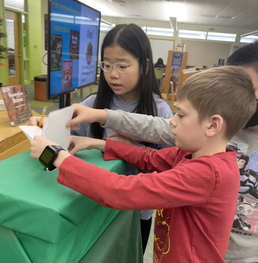
On Monday, January 30, I - like many of you - was glued to the live stream of the American Library Association’s Youth Media Awards, cheering along with the live audience for many of my favorites. I was also putting the final touches on the library’s transformation into an election center for a new collaborative venture, Pike’s inaugural Mock Sibert Award.
During the course of this year, I’ve been excited to re-connect with teachers to support curriculum, especially because a new built-in meeting structure with teaching teams has created consistent co-planning time. Gillian Bartoo is the District Cataloger for Cambridge Public Schools in Cambridge, MA Let’s talk about classifying graphic books. Usually when somebody says to me that their graphics cataloging is a mess what they usually mean is the classifications, or call numbers, are a mess: some are classed as 741.5, some as FIC, and some with other Dewey numbers. Raina Telgemeier’s Smile is in FIC or 741.5 (“work of imagination, comic book”) but Sisters is at 306.8 (“family relationships”). Nathan Hale’s Hazardous Tales are in FIC, 741.5 and 973. El Deafo is cataloged as a biography. Maus I is at 741.5, because it is assigned as a classic text of comic book study, but Maus II is at 940.53 (“World War II”). Every Batman has a different cutter. Manga has an extended 741.5952 call number. Early reader graphics are split between Early Reader and Graphic collections and have both E and 741.5 call numbers. How does anyone get this stuff to sit together in a logical way?
Colleen Simpson is the Library Media Specialist at Lester J. Gates Middle School in Scituate, MA
I have a confession, I love research. I mean I really love discovering the answer to something, but, even more, I love the hunt. I love the process. I love finding an answer for myself and for other people. I even love the humbling feeling of learning that what I thought I knew was either incomplete or totally incorrect. And what I love most of all: there is always more to discover about any subject.
This may seem obvious. One typically assumes that librarians like research, but like most educators I think a lot about my own motivations when considering the student’s motivation. This balance is particularly challenging in middle school when there is less extrinsic motivation than high school. As a staff we are regularly talking about what drives a student, where their interests lie and how we can harness that motivation into the classroom. Tracey Newman is the Library Media Specialist/Librarian at Scituate High School 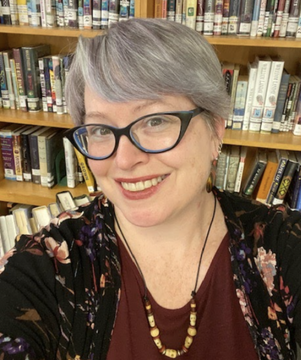 1. What's your name, title and school? Tracey Newman, Library Media Specialist/Librarian at Scituate High School 2. How did you come to librarianship? The long way! It seems so cliche, but I’ve always been a book-lover, and enjoyed organizing my various collections, including books and comics. My undergrad degree is in English, and I worked a few English-related jobs, such as one of the founding editors of the indie paper now known as Dig Boston, and in educational publishing editorial at Houghton Mifflin Harcourt and Educators Publishing Service. JoAnne Vernacchio, my high school English teacher, gets credit for pushing me to become a teacher, when I saw her at a friend’s wedding in 2008. When the Ed Pub industry was consolidating and changing, I passed the licensure tests as a backup plan. After my second child arrived, our family moved to the South Shore, where I grew up–the commute to Cambridge really wore me down. I took a job as the secretary to the Coordinator of Technology and Library Media in Plymouth. Going to conferences and meetings with librarians and tech specialists gave me fresh direction; that’s when I applied to the Library Media K-12 program at Salem State. Switching gears to teach and work as a para for ELA and in the Library at Hingham High in 2015 was a fantastic experience, and they were wonderful people to work with. In January of 2021, I became a long-term substitute Librarian for grades 3-5 in Duxbury, and then got the position at Scituate High. I still feel like a new librarian, though! 3. How would you explain the importance of your role to a nonlibrarian? The other day I described weeding and curation to a new staff member, who admitted those were things they’d never considered. Most people don’t understand that libraries need curating, especially when the collection has books that are outdated or damaged. More books does not equal a great library. On the flip side, people are surprised we still have books, too. Librarians manage a whole space and everything in it: people, books, tech, events. Especially in high school, the library is a gathering place before, during, and after school. My job is as much teaching kids expected behavior in a shared space as it is teaching how to access online resources or find a book to read for pleasure. Dedicated, licensed Library Media Specialists and Librarians are crucial in elementary and middle school, too. We bridge the gap for reading and research in ways that most classroom teachers or digital literacy and reading specialists don’t have in their wheelhouses. Older students get their information from the internet and social media, and it’s important to keep up with those trends. Our information needs to stay current in so many ways. 4. What are you working on right now? A Lego and puzzle drive is currently running to revive a mini makerspace for some creative brain breaks. After not having a full-time librarian for a few years, there’s some catch-up, maintenance, and cleaning-up, plus future planning in the pipeline. The catalog in Destiny needs lots of love, along with weeding in the fiction section and 300s. When the library was remodeled a couple of years ago, all the furniture— including any shelf not attached to a wall— was thrown away. The two-fold work of updating the collection to fit on the shelves that are left plus planning how sections of books will eventually be configured is a fun challenge. 5. What is going well? Having a teacher in the library all day has a positive impact on students and staff, and re-establishing systems and routines was needed. Even though I don’t teach any dedicated classes, I see everybody, and I’m here to help, whether that’s lending out Chromebooks, finding a book, helping to print, citing text correctly, knowing where all the study halls are, or having lots of supplies for last-minute projects. I’m on pretty much all day. 6. What is the most challenging thing so far? Being on pretty much all day! But that’s a good challenge. Changing the culture from when teachers had to find workarounds or adapted to not having as much library support is challenging too— but that culture is slowly turning around. 7. What's the most unexpected thing about your new job? How much students want to be in the library, and the even balance of who wants to hang with their pals versus those who need a quiet spot. We have a learning media commons— basically one big room with different zones— that actually works. 8. What are you reading or watching? I’m savoring Paul Tremblay’s new book, The Pallbearer’s Club, and finally reading All Boys Aren’t Blue by George M. Johnson. On Hulu, Reservation Dogs is amazing. I love the gorgeous new serial adaptation of Anne Rice’s Interview with a Vampire. 9. What do you hope the MA School Library Association can do for you? Connections, connections, connections! Learning from peers, at the conference and online, in such a specialized field, plus combining resources or finding local colleagues through MSLA is a huge benefit. Reba Tierney is the Library Teacher at Waltham High School Love is in the air! If you're reading this, Happy Valentine's Day! (Or Singles Awareness Day, if you prefer!) Scrolling through the archives, I have found the most timely piece of Forum history to share. From the January 2013 Forum, I'd like to take a moment and enjoy a throwback to Author Speed Dating. Much of the January 2013 Forum featured highlights from the upcoming 2013 MSLA Conference to be held that March. One highlight of the conference was the chance to participate in Author Speed Dating.
MSLA President Jen Varney is the Librarian at the Dr. Martin Luther King, Jr. School in Cambridge, MA Welcome to the 2022-2023 school year! I have high hopes for the coming months. With one year of post-remote learning behind us, I won’t say that we can return to normal, because such a return is not possible, but I do think that routines and momentum will come a little easier.
It is good that our work with students may get easier, too, because there are other aspects of our work that are about to get more difficult. Already we have seen more visible book challenges in Massachusetts during the first six weeks of school than there have been in the last three years, they are appearing in the news, on the MSLA listserv, and in conversations. The challengers are well organized and intent on their mission.
Deeth Ellis is the Head Librarian at Boston Latin School in Boston, MA, and a Doctoral Student, School of Library Science, Simmons University
Early indications from the data collected during my study, Principals’ Perceptions of the Role of School Librarians, suggest principals rely heavily on their own school librarian to learn about school librarianship. While not a surprise to many school librarians, this over-reliance on school librarians may be one of the factors that impact staffing in schools and districts. According to Gordon & Cicchetti (2018), Massachusetts’ “school administrators were reported by participants [librarians] as the primary enablers of equitable access to the school library program (instruction, resources, access to the library)” (p.106). Without the principal's understanding, attention, and care, the role of the school librarian can diminish, become obsolete, and even be eliminated.
|
Forum NewsletterCo-Editors
|

